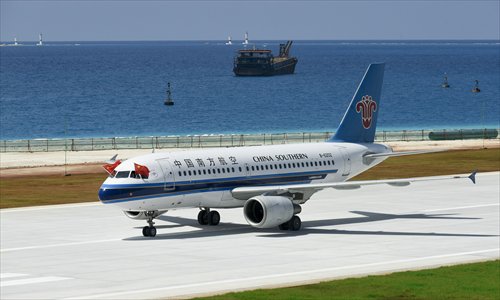China mulls ADIZ in S.China Sea
White paper urges bilateral talks to settle disputes

A China Southern Airlines Airbus A319 plane lands on a newly built airport on Meiji Reef in the Nansha Islands in the South China Sea. Photo: Xinhua
China has the right to set up an air defense identification zone (ADIZ) in the South China Sea, depending on the threat it faces, Vice Foreign Minister Liu Zhenmin said Wednesday as the government issued a white paper calling on the Philippines to settle the maritime territorial disputes with China through negotiations.
The white paper, "China Adheres to the Position of Settling through Negotiations the Relevant Disputes Between China and the Philippines in the South China Sea," was released by the State Council Information Office at a press conference a day after an arbitration tribunal in The Hague ruled in favor of the Philippines.
When asked whether China will beef up military facilities or set up an ADIZ in the South China Sea, Liu said China has the right to set up such a zone, just as it did in the East China Sea.
"If our security is under threat, of course we have the right to set up an ADIZ," Liu told the media. "It depends on our comprehensive judgment."
China established an ADIZ in the East China Sea in late 2013 at the height of tensions with Japan over the disputed Diaoyu Islands.
"We hope the other countries will not take this opportunity to threaten China, and hope they can work with China to maintain peace and stability of the South China Sea, and not turn it into a source of war," he said.
Experts said establishing an ADIZ will be a very difficult decision to make as it will surely be opposed by several countries.
"Compared to the ADIZ in the East China Sea, which is mainly aimed at Japan, an ADIZ in the South China Sea will involve a large number of disputing parties in the region involving legal and diplomatic issues," Zhao Xiaozhuo, a research fellow from the Center on China-US Defense Relations of the PLA Academy of Military Science, told the Global Times on Wednesday.
"Other parties, including the US, Australia, Japan and India, and even Britain and France, may also challenge the air zone because of their interests in the area," he said.
Liu Feng, a Hainan-based expert on the South China Sea, said if the US sends more warships and jets to the South China Sea, it is possible that China will respond with an ADIZ and other defensive measures.
Experts also believe China will not stop its construction activities on the South China Sea islets because of increasing US military presence in the region.
Return to talks
China immediately responded on Tuesday following the arbitration tribunal's decision, saying it would refuse to accept any claims or activities based on the ruling.
The white paper stressed that the Philippines' territorial claim over part of the Nansha Islands is "groundless from the perspective of history or international law."
"The core of the disputes … lies in the territorial issues caused by the Philippines' invasion and illegal occupation of some islands and reefs of China's Nansha Islands," it said.
The document said China and the Philippines had previously held multiple rounds of consultations and had reached a consensus on resolving disputes through negotiations. But the Philippines still resorted to international arbitration in 2013.
"The Philippines' unilateral initiation of arbitration is an act of bad faith," the paper said.
Liu Zhenmin reiterated China's position on Wednesday that the country will trash the arbitral ruling and go back to bilateral negotiations with the Philippines.
"The eventual result will still be coming back to the tracks of negotiations. China hopes to return to bilateral negotiations with the Philippines," he said.
The Philippines has not reacted to China's call for bilateral negotiations, except for a call late Tuesday for "restraint and sobriety."
Liu Feng said the Chinese government has only blamed the previous Philippine administration for the arbitration. He said the current Philippine President Rodrigo Duterte's cautious reaction after the arbitration ruling shows his goodwill.
He added Duterte faces domestic and foreign pressure, as the US has been trying everything to prevent negotiations between China and the Philippines.
Liu Zhenmin also slammed The Hague court's panel of judges for having no members from Asia.

Read more in Special Coverage: